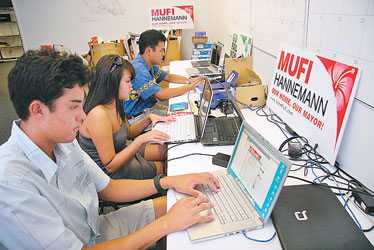 | ||||||||
|
|
"We're starting to see more local campaigns, particularly those in the state House and Senate, invest more money in their Internet campaigning," said David Fry, president and chief executive officer of Tanuki Interactive, a Hawaii-based company that helps politicians and nonprofit organizations build Web sites. "These offices in the past would have very basic Web sites. Now they're making it more interactive and in-depth." Abercrombie, who is running for re-election this year, has perhaps one of the most sophisticated and interactive Web sites of all Hawaii politicians. It is modeled after Hawaii-born U.S. Sen. Barack Obama, who has revolutionized the way Internet and politics have merged by allowing supporters to blog and upload videos and pictures. "The full potential of the Internet has been evolving," said Abercrombie, who was one of Obama's earliest supporters. "I enjoy Twittering. With the Internet, particularly social networking, you get to personalize yourself and expose sides of yourself through an unfiltered medium." In the past, local politicians had simple Web sites with their biography, platform issues and a photo album. Adam Deguire, executive director of the Hawaii Republican Party, tells candidates these kinds of Web sites don't work anymore and advises them to invest serious resources into their "e-campaigning," by hiring online and recruiting student coordinators. Mayor Mufi Hannemann recruited a group of college students to manage his social networking sites, including Facebook, MySpace and Friendster. His Web site, which his campaign dubbed the "virtual headquarters," links to these sites and has slideshows and videos of Hannemann singing. "The Internet has certainly given a voice for my generation," said Tyler Dos Santos-Tam, a 20-year-old Punahou School graduate and Yale University student, who manages Hannemann's social networking sites. "When we have an event, we send out a bulletin on MySpace and an update to his friends. Technology has revolutionized the way politics work." One of the most common option local campaigns have incorporated into their Web sites is the ability to donate online. Ted Hong, a Republican candidate running for state Senate to represent Hilo to Hamakua to Waimea, has raised about 10 percent of his campaign funds online, according to campaign adviser Dylan Nonaka. "The best part of fundraising online is it's easy and virtually free," Nonaka said. "Everyone who gives online is added to a database so if we needed their support later, we can easily contact them again. It's highly efficient." Overall in Hawaii, there is still some reluctance in embracing the Internet for political campaigning. In a recent interview, Gov. Linda Lingle said there needs to be personal interaction in addition to effective Internet campaigning. "On a local level, I want to meet the person. I want to look the person eye-to-eye and shake their hand," Lingle said. "I think the Internet can be very effective in a statewide campaign, where you cannot possibly, no matter how much you want to, meet everyone. But still, I don't think it will ever be a substitute in Hawaii." © Honolulu Star-Bulletin -- https://archives.starbulletin.com
| Tools
| ||||||
 | ||||||||

